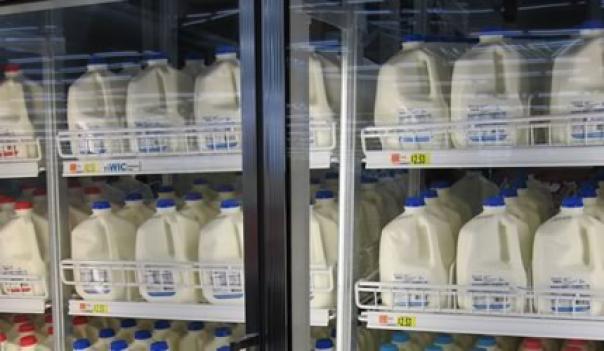
Entitled ‘Principles for eating meat and dairy more sustainably,’ the report calls on consumers and the government alike to “eat less and better meat and dairy,” with eight principal listed: impact on the climate, animal welfare, nature, health, worldwide access to food, effectiveness of antibiotics, resource use and waste, and farmers’s livelihood.
However, chief executive of Dairy UK, Dr Judith Bryans, disagrees: “We (Dairy UK) totally reject any assertion that dairy products are not environmentally sustainable.
“The dairy sector helps feed the UK with efficient, predominantly grass-based milk production, high animal welfare standards, safe and nutritious foods.
“We contribute to food security, look after the land, provide livelihoods and contribute greatly to the national economy.
“Consumers can keep dairy in their diets in the full knowledge that we take our environmental credentials very seriously as we strive to provide them with the tasty nutritious foods they know and love.
“This report too often criticises UK dairy from a global perspective and cherry picks statistics which paint a false picture of the UK industry. Advising consumers to cut their dairy intake is wrong and unhelpful in helping the nation meet its nutritional requirements.
“The authors are also behind the times on global dairy, which is making strides forward on the environmental front and has even signed a Declaration with the UN Food and Agriculture Organisation.
“Despite the fact that we have a lot to talk about by way of our existing environmental credentials, the UK dairy industry is committed to improving its environmental performance through the Dairy Roadmap, setting challenging targets for reducing the sector’s environmental footprint.”
Bryans also addressed the eight individual points, claiming:
On choosing better for the climate: “Milk production only accounts for 2.8% of all UK greenhouse gas emissions. The sector is fully committed to reducing its environmental footprint and has achieved a 24% decline in UK dairy greenhouse gas emissions between 1990 and 2015.”
On choosing better for animals: “95% of UK milk production is Red Tractor Assured, which ensures that dairy products meet a comprehensive list of standards covering animal welfare, traceability and environmental protection, from farm to fork.”
On choosing better for nature: “The overwhelming majority of the UK dairy sector is grass and pasture fed. The proportion of soy in dairy cow feed is small at around 8-15%, compared to the 40% average for UK livestock.
“Farmers have long been careful stewards of the land, and Dairy UK has developed a Biodiversity Strategy outlining actions that dairy processors can take to enhance and promote local biodiversity.
On choosing better for feeding the world fairly: “The UK dairy sector’s sustainable products play a key role in providing nutritious and sustainable produce to consumers around the world.
“In signing the Dairy Declaration of Rotterdam, the UK dairy sector has recognised its global responsibilities in addressing sustainable development, with milk production supporting female empowerment internationally, promoting enhanced animal stewardship and ensuring food security.”
On choosing better for health: “Dairy products are nutrient-rich foods and excellent sources of high-quality protein, vitamins and minerals such as calcium, vitamin B12 and iodine and form part of a healthy balanced diet, which this report fails to recognise.”